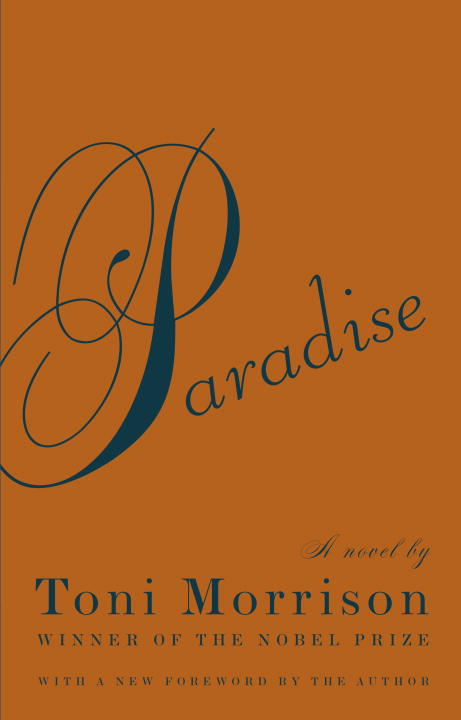Paradise
by Toni Morrison
2020-11-23 13:57:05
They shoot the white girl first. With the rest they can take their time. No need to hurry out here. They are 17 miles from a town which has 90 miles between it and any other. Hiding places will be plentiful in the Convent, but there is time and the d...
Read more
They shoot the white girl first. With the rest they can take their time. No need to hurry out here. They are 17 miles from a town which has 90 miles between it and any other. Hiding places will be plentiful in the Convent, but there is time and the day has just begun. They are nine, over twice the number of women they are obliged to stampede or kill and they have the paraphernalia for either requirement: rope, a palm leaf cross, handcuffs, Mace and sunglasses, along with clean, handsome guns.So begins Toni Morrison's hypnotic and arresting new novel, Paradise, and so will it effectively and hauntingly end. The visit of cruel rage to the Convent frames Paradise, it literally collects and distills all the rich, churning history of this community, focusing the past so that one can say, [T]he venom is manageable now. Shooting the first woman (the white one) has clarified it like butter: the pure oil of hatred on top, its hardness stabilized below. The cruelty called forth at the Convent will hold and completely transform Morrison's searing account of Ruby, Oklahoma, transform it for the reader as well as for the unhinged citizens of this town. And the slaughter will transform Ruby's true if aloof neighbor, the mansion-turned-Convent, known, among other things, for its delicious pecan pies and its strings of peppers, hot as hellfire.Between the bookends of violence, Morrison unfolds her long-reaching history of Ruby, an insular black enclave in the flatland fields of Oklahoma, pop. 360. The town keeps a vivid memory of slavery and the infinite sacrifices of its ancestors by maintaining a brick oven with a suggestive, oracular grillwork inscription. The Oven once read, Beware the furrow of His brow, but time has made the iron grill as protean as the history of the town itself, as susceptible to revision as any of their memories.Chapter by chapter, Morrison patiently spins out the cast of women of the Convent, Connie, Mavis, Gigi, Seneca, and the intertwined lives of the townspeople: Soane, Dovey, Patricia, Reverends Pulliam and Misner, the formidable twins Deacon and Steward Morgan, who own the town bank. This is Morrison at her most sure-handed, creating the myths behind the lives of her many characters, at once entangling and disentangling their collective and individual fates. It is why she is perhaps the most celebrated writer in America.The 1993 winner of the Nobel Prize in Literature, Toni Morrison has forged a hard-edged and lyrical portrait of the American story, exploring the experience of black Americans in her fiction, tracing slavery's roots and the reach of it into life today. Her previous novels include The Bluest Eye (1970); Sula (1973); Song of Solomon (1977), which won the National Book Critics Circle Award; Tar Baby (1981); the successful Beloved (1987), which was awarded the Pulitzer Prize; and the beautiful and brilliant Jazz (1992). Admirers of this previous work will recognize in Paradise an affecting undertow of redemption beneath the vivid pull of violence. As with her other novels, it is in Morrison's attention to language that she is able to show her obvious love and respect for the characters in Paradise. The lyrical intensity and poetry of her language will be familiar, as will her unflinching portrayal of the town's life. With all of their passions, lusts, grudges, dreams, fears, and loves laid bare, the men and women of Ruby and of the Convent seem as fragile and as morally ambiguous as any of us. What the sins of the Convent are, finally, is not completely apparent to everyone in Ruby, but the prejudices and injustices that fuel the violence are unmistakably clear. As with William Golding's Lord of the Flies, the lingering question is, How can something so profane rise out of something so seemingly sacred? Just as on the island of those bestial children, there is an impetus toward a violence in islandlike Ruby. And as successful and convincing as the ratcheting up of that violence is, it is in the heart-catching aftermath of the event that Morrison shines brightest, that her writing is the most poignant. Near the close of the novel, after the slaughter at the Convent, one of the Morgan brothers, Deacon, tells a story about his and his brother's grandfather, one of the town fathers. Grandfather Zechariah walked barefoot for two hundred miles rather than dance, Deacon explains. Few knew and fewer remember that Zechariah had a twin, and before he changed his name, they were known as Coffee and Tea. When Coffee got the statehouse job, Tea seemed as pleased as everybody else. And when his brother was thrown out of office, he was equally affronted and humiliated. One day, years later, when he and his twin were walking near a saloon, some whitemen, amused by the double faces, encouraged the brothers to dance. Since the encouragement took the form of a pistol, Tea, quite reasonably, accommodated the whites, even though he was a grown man, older than they were. Coffee took a
Less





























